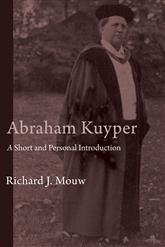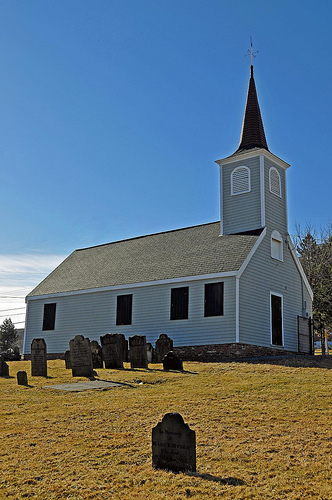
The fifth post in a series drawing from and interacting with Richard Mouw’s Abraham Kuyper: A Short and Personal Introduction (Eerdmans, 2011).
Today there is a fundamental error occurring in the way we think about the Church. We confuse and collapse two concepts into one, leading us down a dangerous path. These concepts are the Church of Christ and the Kingdom of Christ. “Kuyper makes much of the fact that the Kingdom of Christ is much bigger than the institutional church.” (Mouw, 57) When we hold that the whole domain of Christ is in the institution of the Church, we limit the reach of Christ in His world and make Christ into something that He is not; an idol that only exerts power over a small part of Creation.


The Church is only a small part of the Kingdom of Christ’s Kingdom. It is important and has a great role to fulfill, but is not the fullness of the Kingdom. The church is
where we as believers gather to worship – where we are shaped by the preaching of the Word, by participation in sacraments, by instruction in the church’s tradition and teaching, and by less formal patterns of fellowship. (57)
These activities are part of the Created Order, but are not the Created Order. The church is “only one part of the Kingdom.” (57) The Kingdom of Christ is “that broad range of reality over which Christ rules.” (57) In Kuyper’s view, this means that the Kingdom of Christ is the whole Cosmos; every square inch and not just one square inch. The Kingdom extends over all aspects and areas of life. It cannot be condensed into just one part of reality. It is Reality itself. In another sense, the Kingdom of Christ is “wherever followers of Christ are attempting to glorify God in one or another sphere of cultural interaction.” (56) With this, we should hear echoing in our head the voice of Jesus when he said, “For where two or three are gathered in my name, there am I among them.” (Matthew 18:20, ESV)


The Church, as stated in a previous article, is one sphere among many. It has its limited authority and has a specific role to play out in the lives of all. It is a cultural activity that exists beside other cultural activities. And inside of the Church writ large, there are many smaller churches. It is easy to mourn the plurality of churches in existence. One only needs to look around the town or city they live in to see that many (seemingly too many) denominations exists. We have Lutherans, Pentecostals, the Christian Reformed Church, the Reformed Churches of America, Reformed Baptists, Southern Baptists, Regular Baptists, Anabaptists; the list is almost endless and spans the spectrum of all races and cultures. We bemoan these schisms between churches and form ecumenical movements and found non-denominational churches to bring together all that profess the name of Christ into some form of unity. To show the problem of bringing all beliefs together, we only need to look at the current state of the Unitarian church. There are so many teachings that need to be brought into line with each other that we get to the point that there is no teaching at all. In the name of unity, all character and meaning is lost. All these denominations are good for the Church writ large. For Kuyper, “having many churches . . . is a way of keeping any church from over-reaching” (56) their boundaries and trying to exercise too much control. Having many viewpoints inside of the Church allows for correction of errors.[1]

An example of this is the correction that the Reformed churches following Luther, Calvin, and Kuyper provide to the modern evangelical. Evangelicalism has at its heart an “enthusiastic embrace” of the message that “we are lost sinners who need to look to the atoning work of Christ on Calvary as our only hope for Salvation.” (86-87) This is not the fault that Modern Evangelicalism has but it is the root of the error that comes out of it. For many followers of evangelism hold that “it often focuses exclusively on personal religion.” (87) Christ becomes the person that saves my personal soul, but it stops there. We can see this in the rise of Dispensationalism. Christ is concerned with our souls as they are the only things that will survive for eternity. The world will burn up, so why redeem it is/was a popular opinion in this part of the Christian world. Along with this, a strong anti-intellectualism is imparted, because Jesus speaks directly to me in Scripture, so why would we look to outside works to explain it? Kuyper and Calvin try to combat this first attitude by showing the concern for all of Creation that is shown in the Creation narrative all the way through to the creation of a new heaven and earth. The Reformed churches try to combat this second attitude by pointing to the call to renew our minds and to always have a reasonable defense of the Gospel. However, this second correction has lead to other problems. In its rush to combat anti-intellectualism, the Reformed church has elevated the mind and forgotten that feelings are in integral part of life, including the Christian life. Mouw states that he has “often worried about the fact that there are aspects of the ministry of the Holy Spirit that have not received sufficient attention in (his) kind of Reformed theology.” (88) To correct this error, we can turn to the more Pentecostal/charismatic teachings found in other denominations. For “Pentecostal and charismatic theologies have provided us with profound insights into the transforming power of the (Holy) Spirit in our individual lives, as well as in the community of believers.” (89)

Inside of these examples we can see Kuyper’s ecumenical vision. We should not seek to cater to all Christians in all church services. We should have different doctrines, even if at sometimes they are at odds. We lose something when we only have one church and one doctrine. What we lose is the corrective power of dissenting voices. In essence, we lose what the church is and is called to be. Instead of mourning the differences inside of the Church let us come together and celebrate the pluroformity that God has created.
The next (and concluding) post in the series will explore The Legacy of Kuyper.
[1]One of the ideas that Kuyper advocated may strike as blatantly wrong and seems to need to be rejected out of hand, which makes us not realize the truth underneath. Kuyper, in a strange way, advocated for and not against heresy in the church. We will examine this in depth later, as Mouw does not highlight this aspect of Kuyper’s thought.
Adjunct Professor of Philosophy at Grand Rapids Community College and Kendall College of Art and Design. MA in Philosophical Theology from the Institute for Christian Studies, BA in Philosophy and Worldview Studies from Cornerstone University.

Leave a Reply